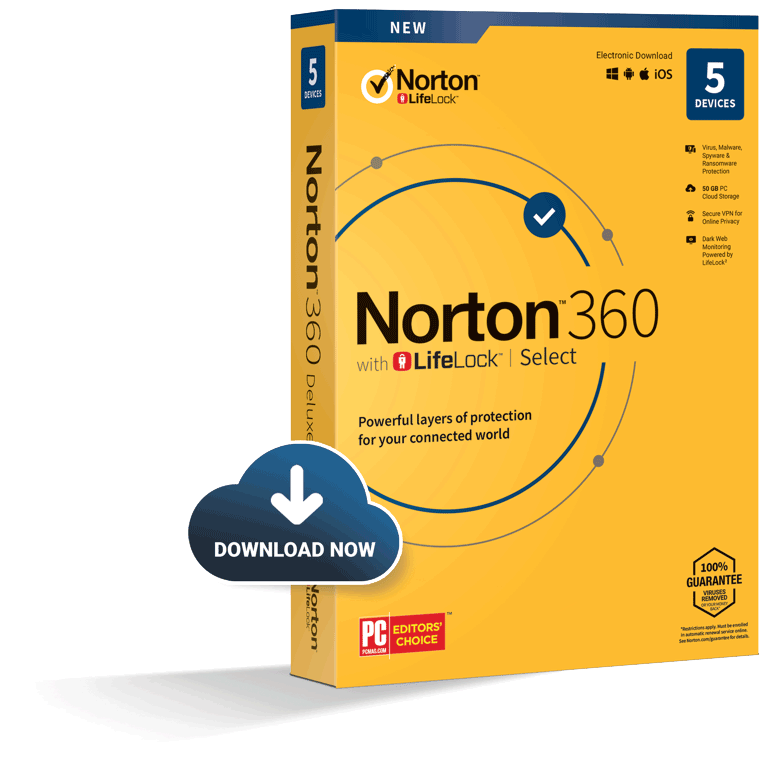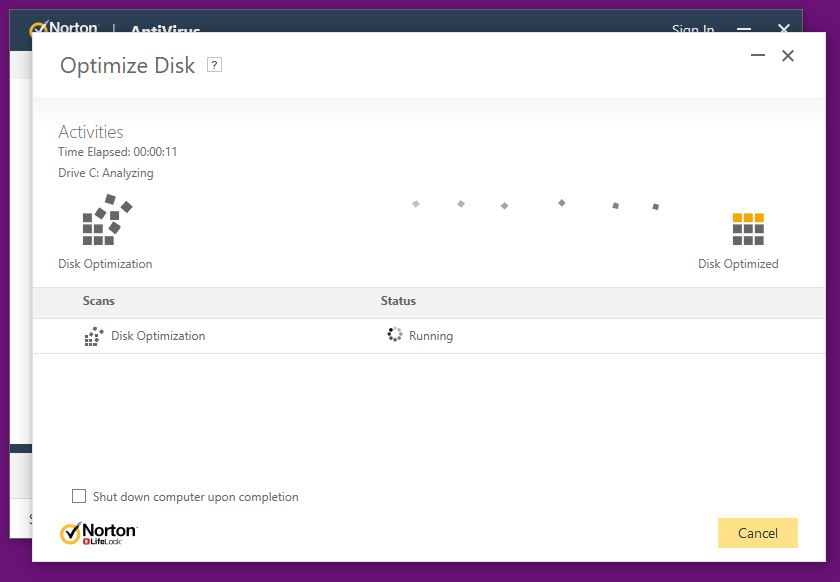Symantec's Norton 360 malware protection stops attacks quickly, but guzzles resources on some devices.
I spent a few months thoroughly testing Norton 360. While the overall feel and function of this antivirus software hasn't changed too much from past versions, some new features are included and some options that haven't been available before. Here is the rundown of what I learned while testing this antivirus program
Secure and protect
Norton AntiVirus Plus
Bottom line: Norton created some significant slowdown on my test computers, and it became increasingly frustrating to wait for them to buffer, connect and load webpages when I hadn't experienced that much of a lag before installing Norton 360. I am impressed that this basic antivirus program includes a firewall, password manager, and online backup storage when other programs are barer. And Norton continues to do a good job blocking malware.
Pros
- Good protection
- Extra security tools
- Local and cloud options
Cons
- Creates noticeable lag
What's impressive about Norton 360
Norton has always impressed with how well it recognizes and stops all types of malware, including viruses, spyware, keyloggers, Trojans, rootkits, and ransomware. In both my past and most recent tests of Norton's antivirus software, it has earned perfect or near-perfect scores each time. Most internet threats were stopped before they could download to my computers, and phishing schemes were marked with warning messages. I could see the details of each tagged threat stopped by Norton when I clicked the Details link in the browser message. Norton 360 software has earned perfect scores from other third-party testing facilities.
All Norton 360 programs include an impressive amount of extra security tools. These include a password manager, a personal firewall, webcam monitoring, and online backup storage. Storage starts with 10GB of space with Norton 360 Standard and going up to 100GB with Norton 360 Select. And you now have the option to include an account with LifeLock that will monitor your identity and notify you if it is stolen or used in any way.
The firewall monitors your network and everything communicating with your computer through your internet connection. Usually, your home service is pretty secure, but having a firewall on when connected to a public hotspot is essential since this is where a lot of dangerous communication tends to happen. But it's helpful to monitor your personal connection, too, since no one security measure or program is infallible.
The password manager holds all your complicated passwords used to log into online accounts in one secure folder. This manager both secures passwords from being swiped and makes them easily accessible by you when you need to remember a password or two. The extra protections around the password manager make it difficult for keyloggers and other prying eyes to snatch login credentials, steal your identity or swipe bank, credit card, and other account information.
For Norton Deluxe and Select users, you have access to impressive parental controls. These work on both computers and cell phones, and let you block specific apps, websites, or content from being viewed by your children. You can also set time controls, and I like the detailed reports of exactly what my children are typing into search bars and text fields, including IM programs.
Something new that is available with Norton 360 is the option to house the program locally on your desktop or in the cloud. Both give you excellent protection, though not installing it on your computer does free up resources and doesn't create as much drag as when Norton is deployed from online. However, when using the web version, you do need to be connected to the internet for most features, protections, and detections to work correctly.
What irks me about Norton 360
Many users have given feedback that Norton 360 uses less resources and therefore is lighter on their systems and doesn't create a much drag. I just did not see this. After installing Norton on my test computers and on a couple of mobile devices, each one began experiencing noticeable lag. It took a long time for systems to boot up, for programs to launch and to navigate from one website to another. Plus, having the Norton Security browser extension added to both Google Chrome and Mozilla Firefox caused a lot of browser crashes. Several legitimate websites were blocked by the browser, even popular web pages like Google, CNN, Yahoo, Amazon, and eBay. I finally was able to browse the web without a headache after both disabling the browser extensions and, ultimately, uninstalling Norton altogether.
I didn't experience as much computer drag when allowing Norton 360 to be hosted in the cloud rather than locally on my device. There are still some components that need to be installed on your computer, but having most of it cloud-based does free up a lot more resources and allow your system to run faster. However, in both cases, I still had several problems when using browser extensions.
You may not like the price tag of this program. Norton 360 starts at $80 per year for its Standard program and goes up to $150 for its Select program that includes a LifeLock account. This is substantially higher than other antivirus software programs that you can get for under $60. Norton does, often, offer an introductory price for first-time users, which does help, but just be prepared to pay the full amount in a year when your subscription comes due.
Norton 360 with or without LifeLock?
Norton now owns LifeLock and offers an identity theft monitoring accounts with some of its Norton 360 programs, or you can purchase it separately if you choose an antivirus program that doesn't offer it as part of its package. While this is an additional cost, I highly recommend it as an extra layer of protection. Having personally used LifeLock to monitor my identity, I enjoy the peace of mind that comes with having a professional looking out for my personal information.
Take advantage of the LifeLock identity theft protection included with Norton 360 programs.
LifeLife is very thorough as it keeps tabs on your identity. It looks for the obvious - thieves using your information to take out loans, open credit cards or banking accounts, and selling your information on the black market. But LifeLife also looks for the unusual like health insurance numbers being used to receive medical treatments, or a criminal using your name as an alias. LifeLock also searches the dark web where your identity may be used to clone social media accounts and hack email accounts. Other things LifeLock monitors include your email addresses, driver's license numbers, and telephone numbers. It will send requests on your behalf to companies to stop sending junk mail and remove your name from contact lists. For an extra fee, LifeLock will monitor your children's identities, too, so when it's time to head out on their own, they don't have to deal with the hassle of reclaiming their identity to get a student loan, purchase their first car, or rent an apartment.
As a customer of LifeLife, if your identity is ever stolen, or if you lose your wallet, LifeLock will help you cancel credit cards and place holds on your credit reports. It will also walk you through the steps you need to notify creditors or the IRS. And if your stolen identity is ever used while LifeLock is monitoring your account, you are covered by its $1 million guarantee. LifeLock will help you recover your identity and pay any fee associated with the recovery of up to $1 million.
Norton 360 antivirus program caused a noticeable amount of lag while testing, but it still does an excellent job stopping internet threats. It also comes with an impressive amount of extra security tools, like a password manager and firewall, plus a couple of gigs for online backup storage. This program is pretty pricey, though, unless you're a new user to take advantage of the offered discount. The cost is worth it if you go with Norton Select with a LifeLock account.
Secure and protect
Norton 360
Secures against malware threats
Norton 360 protects from online threats and secures sensitive files from ransomware. LifeLock identity monitoring is available.



